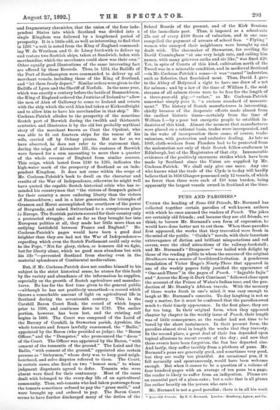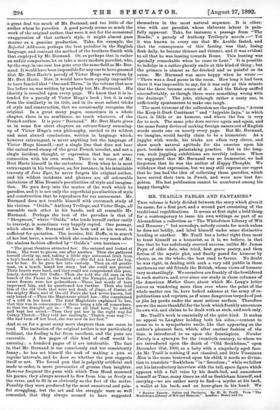PUNS AND PARODIES.*
UNDER the heading of Some Old Friends, Mr. Burnand has collected together certain parodies of well-known authors with which he once amused the readers of Punch. The jokes are certainly old friends ; and because they are old friends, we
think, to borrow Mr. Burnand's own form of expression, he would have done better not to cut them. When these parodies first appeared, the works that they travestied were fresh in the mind of the public. "0 uida's " novels, with their luxuriant extravagance of diction and brilliant misquotations and red covers, were the chief attractions of the railway-bookstall ; and Mr. Burnand's " Strapmore " was hailed with delight by those of the reading public to whom the success of the original
Strathmore was a source of bewildered irritation. A ponderous translation of Victor Hugo's Ninety-Three that appeared in one of the weekly papers fully justified the appearance of "One-and-Three" in the pages of Punch. " Injyable Injia "
and" Across the Keep-it-Dark Continent "followed close upon the account of the Prince of Wales's Indian tour, and the pro- duction of Mr. Stanley's African travels. With the memory of those works fresh in one's mind, it was easy enough to laugh at Mr. Burnand's conceits. To-day laughing is not so easy a matter, for it must be confessed that the parodies owed much to their timely appearance. In the first place, they are far too long. In their original form, when they appeared
chapter by chapter in the weekly issue of Punch, their length
was of little consequence, RS the reader had not time to be bored by the short instalments. In their present form, the parodies almost rival in length the works that they travesty.
In the second place, a great deal of their fun depended upon topical allusions to recent events of the day ; and now that these events have been forgotten, the fun has departed also.
And lastly, they stiffer terribly from a plethora of puns. Mr. Burnand's puns are generally good, and sometimes very good,
but they are really too plentiful. An occasional pun, if it fell naturally and spontaneously, would have been welcome enough. Bat when it comes to be a question of a volume of four hundred pages with an average of ten puns to a page, the reader is likely to stiffer from an indigestion. Plums are an essential part of a plum-cake ; but a cake that is all plums lies rather heavily on the person who eats it.
Mr. Burnand is not a good parodist; there is in all his work
• Some Old Friends. By F. C. Burnand. London : Bradbury, Agnew, and Co.
a great deal too much of Mr. Burnand, and too little of the author whom he parodies. A good parody seems so much the work of the original author, that were it not for the occasional exaggeration of that author's style, it might almost pass muster as a genuine production. Take, for example, the Rejected Addresses, perhaps the best parodies in the English language, and contrast the method of the brothers Smith with that employed by Mr. Burnand. Or, as perhaps that is rather an unfair comparison, let us take a more modern parodist, who, by-the-way, in one case has gone over the same field as Mr. Bur- nand. It would have been impossible for any one to have guessed that Mr. Bret Harte's parody of Victor Hugo was written by Mr. Bret Harte. Now, it would have been equally impossible to have fancied that "One-and-Three," in the volume that now lies before us, was written by anybody but Mr. Burnand. His identity is revealed upon every page. We know that it is in- tended for a parody of Victor Hugo's book ; but it is only from the similarity in its title, and in its most salient tricks of style and construction, that we occasionally recognise the original. In a great many pages, sometimes in a whole chapter, there is no semblance, no touch whatever, of the French author. It is pure "Burnand." Mr. Bret Harte gives us in some few short chapters an extraordinary summing- up of Victor Hugo's own philosophy, carried to its wildest and most absurd conclusions, written in language which, however extravagant, is never anything but the language of Victor Hugo himself,—not a single line that does not bear the caricatured stamp of the great French novelist, and not a single incident, thought, or expression that has not some connection with his own works. There is no trace of Mr. Bret Harte himself in the caricature. Even when he is most extravagant in his burlesque, as, for instance, in his inimitable travesty of Jane Eyre, he never forgets his original author, and his wildest incidents and phrases are all colourable imitations of Miss Brontii's peculiarities of style and imagina- tion. He goes deep into the matter of the work which be parodies, and it is not only the superficial peculiarities of style and construction that he reproduces for our amusement. Mr. Burnand does not trouble himself with overmuch study of his victims. " Ouida," Anthony Trollope, and Victor Hugo, all resemble each other in his hands, and all resemble Mr.
Burnand. Perhaps the best of the parodies is that of " Strapmore," where "Oujda," who lends herself rather easily to travesty, is sometimes very happily copied. One passage, which shows Mr. Burnand at his best and at his worst, is sufficient for quotation. The heroine, Itti Duffa, is in search of her lost lover, a search which she conducts very much after the aimless fashion affected by " Onida's " own heroines :—
"The great theatres attracted her. She entered and looked at them. She went to pieces, one after another. Then she gathered herself slowly up, and, taking a little ripe autumnal fruit from a boy's basket, she ate it thankfully.—She did not know the boy, nor he her. So he gave her into custody. Then an old gentle- man, on a bench, heard her story : but she could not prevail. Their hearts were hard, and they could not comprehend this poor, lonely, destitute Itti Duffa.—Then she told the old man on the bench of the Fauns in the water, and the Nymphs, and how the sweet flowers were her godmothers.—These last words of hers impressed him, and he questioned her further. Then she told him of the old Gods that were not dead, of Jingo, of Simini, of the mighty Mars, and of the old Parrs she had never known, but only heard of.—Then the Magistrate pitied her.—She complained of a cold in her head. The kind Magistrate explained to her, that this was in consequence of there being a tile off somewhere.
• so that the draught got in.—' We are all tiled here,' he added, and kept her secret. —Then they put her in the right way for Colney Thatch.—They told her smilingly, Thatch your way She had been off her head, she was now on her feet."
And so on for a great many more chapters than one cares to read. The imitation of the original author is not particularly brilliant, the fooling is far from excellent, and the puns are execrable. A few pages of this kind of stuff would be amusing ; a hundred pages of it are intolerable. The fact is, that Mr. Burnand is too consciously and too consistently funny; he has set himself the task of making a pun at regular intervals, and he does so whether the pm suggests itself or not. The forced pun that is palpably artificial and made to order, is more provocative of groans than laughter. However frequent the puns with which Tom Hood seasoned his poems, they always seemed to flow from him as freely as the verse, and to fit in as obviously as the feet of the metre. Possibly they were produced by the most unnatural and pain- ful struggling, but the art and the struggle were so well concealed, that they always seemed to have suggested themselves in the most natural sequence. It is other- wise with our parodist, whose elaborate labour is pain- fully apparent. Take, for instance, a passage from "The Beadle," a parody of Anthony Trollope's novels :—" Yet it was known to every one that Mr. Arable fasted, and that the consequence of this fasting was that, losing flesh daily, he became thinner and thinner, and it was evident to all that he was leaning towards Rome. This leaning was specially remarkable when he came to Lent." It is possible to indulge in a rather ghostly smile at this kind of thing ; but the grimace is almost as far-fetched and as painful as its cause. Mr. Burnand was more happy when he wrote :— "There was a dead pause in the room. How long it had been there it was impossible to say, for it was only at this minute that the three became aware of it. And the Bishop sniffed uncomfortably, as though there were something wrong with the drainage." The joke, although rather a nasty one, is sufficiently spontaneous to make one laugh.
The most tiresome of the collection are the parodies, "Across the Keep-it-Dark Continent " and " Injyable Injia," in which there is little or no humour, and where the fun is very far to seek. The same joke does service again and again, and the same funny device of making foreign names out of English words meets one on nearly every page. But Mr. Burnand, we imagine, would hardly claim to be a humourist. As a juggler with words, his tricks are often very clever, and show much natural aptitude for the exercise upon his part, besides much painstaking practice. But in the long- ran, such juggling exhibitions are terribly tedious. When we suggested that Mr. Burnand was no humourist, we had forgotten that he was the author of Happy Thoughts. We withdraw that expression, but we may still express our regret that he has had the idea of collecting these parodies, which have served their turn in Punch, and were now best for- gotten. His last publication cannot be numbered among his happy thoughts.



































 Previous page
Previous page